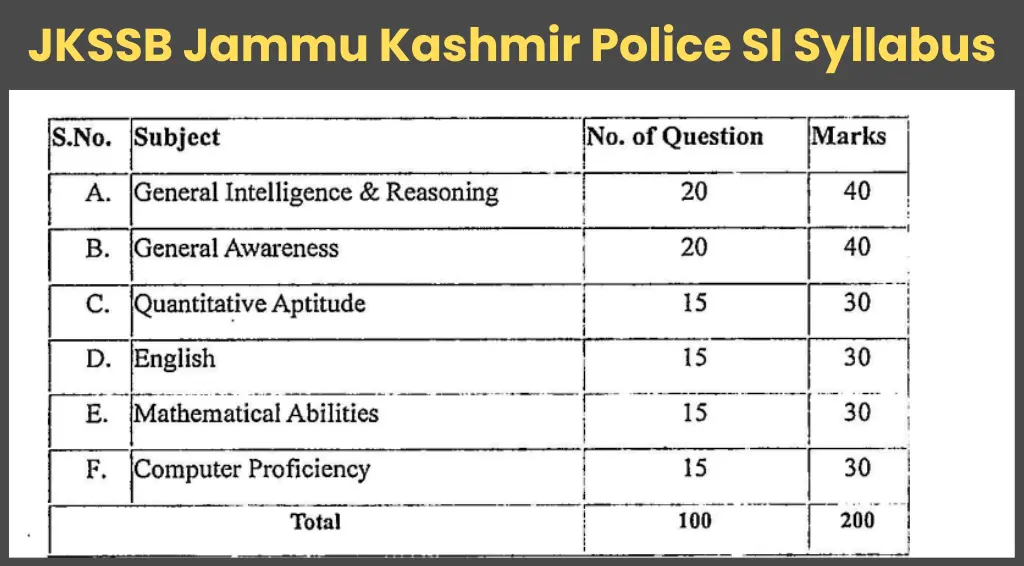JKSSB Jammu Kashmir Police SI Syllabus: The Jammu & Kashmir Services Selection Board (JKSSB) has released the syllabus for the post of Sub-Inspector in the Home Department. This detailed syllabus will guide aspirants preparing for the examination, which includes multiple-choice questions divided into six parts. Below is the detailed syllabus:
Examination Details
- Total Questions: 100
- Maximum Marks: 200
- Duration: 120 minutes
- Negative Marking: 0.5 marks per wrong answer
JK Police SI Syllabus Overview
| Subject | Number of Questions | Marks |
|---|---|---|
| General Intelligence & Reasoning | 20 | 40 |
| General Awareness | 20 | 40 |
| Quantitative Aptitude | 15 | 30 |
| English Comprehension | 15 | 30 |
| Mathematical Abilities | 15 | 30 |
| Computer Proficiency | 15 | 30 |
| Total | 100 | 200 |
Below is the subject-wise syllabus for the post of Sub-Inspector in J&K Police, as provided in the official notification:
1. General Intelligence & Reasoning (20 Questions, 40 Marks)
This section will test a candidate’s analytical and reasoning abilities. The topics include:
- Analogies: Semantic, Symbolic/Number, and Figural
- Classifications: Semantic, Symbolic/Number, and Figural
- Series: Semantic, Number, and Figural
- Problem Solving
- Word Building
- Coding and Decoding
- Numerical and Symbolic Operations
- Trends
- Space Orientation and Visualization
- Venn Diagrams
- Drawing Inferences
- Punched Hole/Pattern Folding and Unfolding
- Figural Pattern-Folding and Completion
- Indexing
- Address Matching
- Date and City Matching
- Classification of Centre Codes/Roll Numbers
- Small and Capital Letters/Numbers
- Embedded Figures
- Critical Thinking
- Emotional Intelligence
- Social Intelligence
2. General Awareness (20 Questions, 40 Marks)
This section will assess the candidate’s awareness of their surroundings and its application to society. Topics include:
- Current events and general environment
- History, Culture, and Geography (focus on India and J&K)
- Economics and General Policy
- Sports
- Science and Scientific Research
- People in News
- Current Affairs
3. Quantitative Aptitude (15 Questions, 30 Marks)
This section tests the candidate’s mathematical and numerical ability. Topics include:
- Whole numbers, Decimals, and Fractions
- Percentage
- Ratio & Proportion
- Square Roots
- Averages
- Interest (Simple and Compound)
- Profit and Loss
- Discount
- Partnership Business
- Mixture and Alligation
- Time and Distance
- Time and Work
4. English Comprehension (15 Questions, 30 Marks)
This section evaluates English language proficiency. Topics include:
- Vocabulary and Grammar
- Sentence Structure
- Synonyms and Antonyms
- Spotting Errors
- Fill in the Blanks
- Detecting Misspelled Words
- Idioms & Phrases
- One-word Substitution
- Sentence Improvement
- Active and Passive Voice
- Conversion of Direct/Indirect Narration
- Shuffling of Sentence Parts
- Shuffling of Sentences in a Passage
- Cloze Passage
- Comprehension Passages (Based on stories, reports, editorials, etc.)
5. Mathematical Abilities (15 Questions, 30 Marks)
This section assesses basic mathematical concepts, including:
- Algebra:
- Basic Algebraic Identities
- Elementary Surds
- Graphs of Linear Equations
- Geometry:
- Triangles and their Centers
- Congruence and Similarity of Triangles
- Circle and its Chords, Tangents
- Angles Subtended by Chords of a Circle
- Common Tangents to Two or More Circles
- Mensuration:
- Triangles
- Quadrilaterals
- Regular Polygons
- Circle
- Right Prism
- Right Circular Cone and Cylinder
- Sphere and Hemispheres
- Rectangular Parallelepiped
- Regular Right Pyramid with Triangular or Square Base
- Trigonometry:
- Ratios
- Complementary Angles
- Heights and Distances
- Statistics and Probability:
- Histograms
- Frequency Polygons
- Bar Diagrams and Pie Charts
- Measures of Central Tendency: Mean, Median, Mode
- Standard Deviation
- Simple Probabilities
6. Computer Proficiency (15 Questions, 30 Marks)
This section assesses basic computer knowledge. Topics include:
- Computer Basics:
- Organization of a Computer
- Central Processing Unit (CPU)
- Input/Output Devices
- Computer Memory and Memory Organization
- Backup Devices and Ports
- Windows Explorer and Keyboard Shortcuts
- Software:
- Windows Operating System
- Basics of Microsoft Office (Word, Excel, PowerPoint)
- Internet and Emails:
- Web Browsing and Searching
- Downloading and Uploading
- Managing an Email Account
- E-Banking
- Networking and Cybersecurity:
- Networking Devices and Protocols
- Network and Information Security Threats (Hacking, Virus, Worms, Trojans, etc.)
- Preventive Measures
Note:
- Questions in General Intelligence, General Awareness, and English Comprehension will be at the graduation level.
- Questions in Quantitative Aptitude, Mathematical Abilities, and Computer Proficiency will be at the 10th standard level.
Download PDF JKSSB SI Police Syllabus PDF


